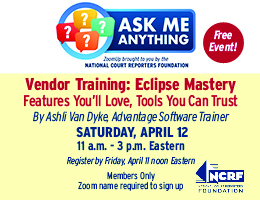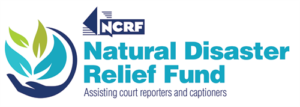
Captioners have been reporting both cancellations of on-site jobs and an increase in remote jobs as the coronavirus pandemic has led to the closures of colleges, conferences, and even courtrooms. We reached out to a number of captioners to see what they could share to help everyone work through this fast-changing situation.
Just how fast things have changed can be seen in a story from CART captioner Laura Melby, RPR, CRR, CRC, of Rootstown, Ohio, who works with Kent State University, the University of Akron, and Stark State College, where she provides both on-site and remote CART. She explained that she was on the scene on Monday, March 9, as Kent State held their Faculty Senate meeting and explored what-if scenarios regarding the coronavirus. Melby said, “Administrators were thinking in two-week chunks of time at that point and were looking ahead at what professors would need to do if ever the university would need to close and hold classes online. Monday evening after that Faculty Senate meeting, I emailed supervisors, professors, and students that I work with at all three institutions and let them know that I have experience in remote CART and that, yes, we can continue working together in the event any universities would close in the future.
“Much to my surprise, less than 24 hours later we were informed that classes would be held online at each university, because all were closing,” Melby continued. “Throughout the week changes have been made on what felt like an hourly basis as administrations had a chance to think through more fully the details of the situation.”
Norma Miller, RPR, CRR, CRC, a captioner and agency owner in St. Albans, Vt., explained that the coronavirus shook up her weekend: “I have spent the entire weekend (very long hours) helping to set up a new client for a big event that has been last-minute transitioned to virtual, and coordinating for one of our captioners (who is local to the event) to be able to caption for them.” At the same time, like many of us, she was also trying to prepare for her family and get ready to shelter in place.
Karen Yates, FAPR, RPR, CRR, CRC, a captioner in Minden, Nev., and a past president of NCRA, shared: “Over 60 hours of remote meetings and conferences cancelled for the month of March alone, both U.S. and international. For those already working remotely, hang on. The demand will increase when people realize the benefits of abandoning in-person for online events.”
Patricia K. Graves, FAPR, RDR, CRR, CRC, an agency owner and CART captioner based in Monument, Colo., shared: “While I am feeling an effect for conferences and international meetings, the rest of my work is continuing on steadily. I am lucky!”
Two important qualities for weathering this challenge are to be prepared and remain calm. Carol Studenmund, FAPR, RDR, CRR, CRC, chair of NCRA’s Captioner Subcommittee on Captioning Inclusivity, an agency owner and captioner based in Portland, Ore., said: “We never know when something out of the ordinary is going to happen. It could be a weather event or a family issue. And now we can add a pandemic to our life’s experiences. Be prepared both financially and with regards to your health.”
“It’s always a good idea to keep a positive attitude, even if only to get yourself through some tough days and weeks,” continued Studenmund. “I am looking at this situation as an opportunity to show our clients and potential clients how up to the task we are. Our clients need some assurances that we have things under control, and we will provide solutions to their needs, not make their problems bigger.”
“Try to keep things in perspective. Things could be much worse. Adjust your expectations and try to enjoy the slowdown,” said Miller.
Go remote – and stay home
Those already set up to work remotely are seeing the advantages of past training now. “Working remotely has turned out to be a real win for me,” said Yates. “Captioning from my home, I am able to socially distance myself as the crisis builds, thus protecting my health and the health of my family. I’m also able to keep working. Despite the cancellations, work keeps pouring in. Many of the latest jobs on my books are from classes and meetings that were originally in-person meetings that have gone online in order for those schools and organizations to keep doing business while this virus circulates among our population.”
“We have been showing some old and new clients how easy it can be to switch their onsite events to remote events, and still make them accessible with quality captioning. A few new clients have already come around, because so many have been forced to shift to online, and they want to make their events accessible,” Miller said. “YouTube has recently changed their tools and documentation for setting up for live captioning. But the key words to use when explaining to a client how to set up their livestream for captioning are ‘captioning ingestion URL’ — and tell them to turn OFF (or UNCHECK) autocaptions. The captioning ingestion URL is what you put into your captioning software (or StreamText or 1CapApp) to caption directly to a YouTube live event.”
If you don’t know how, learn it now
If you haven’t taken the time before, said Studenmund: “Learn it now. Don’t put off learning new skills and tools until this kind of challenge faces you. Pull out some ideas for new software skills you want to learn and learn them now if you have the time available.” If your work schedule is suddenly light, now is a great time to do some training on the many remote products available to report remotely, earn CEUs, or even earn a certification. Attending to any of these tasks during the enforced slowdown could gain you dividends with future jobs.
To get back to learning more:
“Remote CART has two elements,” said Graves. “One is to receive the audio. It can be via a phone line or a Skype connection or a Zoom connection or Blue Jeans. The other connection is a way to see the text so they can click on the URL to see the text. At its most basic level, we have to hear it and they have to receive and see the text.”
“Take advantage of online training programs in your newly found downtime to learn more about working with platforms you may be unfamiliar with, such as Zoom, Adobe Connect, Blackboard Collaborate Ultra, StreamText and 1CapApp,” said Melby. “No one knows how long the coronavirus pandemic will affect our jobs. We might as well plan for the worst and hope for the best. Having knowledge of several platforms cannot hurt a resume, either, right?”
“Fellow CART providers, this is our time to shine!” said Melby. “My suggestion is to look for ways you can help consumers and then put yourself out there.”












